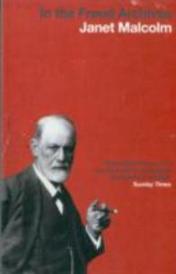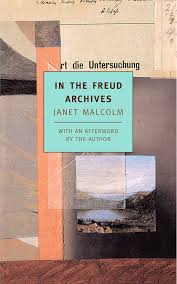For my second entry in Ana and Iris’s Long-Awaited Reads Month, I read Janet Malcolm’s book In the Freud Archives. When I discovered Janet Malcolm back in October 2011, In the Freud Archives was the book of hers that appealed to me the most. For one reason or another, I didn’t get to read it until Christmas vacation.; and I think I might have liked it better if I’d read it sooner.
I am not exactly disillusioned with Janet Malcolm, but I’m not not disillusioned with her. Her writing remains as beautifully clear and elegant as I ever thought it was. She is still the person I turn to when David Foster Wallace has worn me down with his ceaseless locutions. Lo:
Human nature is such that when we are suddenly taken up by someone whom we consider superior and admirable, we accept his attentions calmly, whereas when we are dropped we cannot rest until we feel we have got to the bottom of the person’s profound irrationality. Nor can we easily accept the verdict sent down to us through the mortifying silence of someone who has found us wanting and has packed up and moved on. We protest it, each in our way — our futile ways, since the more effective is our protest the more surely do we drive away the person whose love we have lost not because of anything we did, but because of who we are.
Good, right?
On the down side, I am finding that Malcolm’s acknowledgement of the ethical problems posed by journalism does not inoculate her against those problems. Whereas the controversies she covers in her literary biographies remain interesting and relevant — we won’t stop caring about what sort of person Sylvia Plath was, or about the inherent problems of someone like Bronwyn Hughes controlling Plath’s letters and estate — something like In the Freud Archives feels pointlessly petty and gossipy. Viz.:
[Jeffrey Masson said,] “Wendy [O’Flaherty] was even worse, in her way, though I thought, Well, at least she’s a woman. I remember once trying to touch her, and she looked at me and said, ‘Frankly, I don’t think you’re man enough to have an affair with me.’ I ran into this sort of thing everywhere I went at Harvard.
and much later in the book:
[Wendy O’Flaherty said,] “I gather from other people that [Masson’s] not nice to anybody, but he certainly has always been beastly to me. I wouldn’t sleep with Jeff, and he might have regarded that as a kind of gauntlet.”
This sort of thing feels like a waste of Janet Malcolm’s — or anyone’s — time. So much of In the Freud Archives — and this was true of The Crime of Sheila McGough and The Journalist and the Murderer as well — is spent in quoting long, complicatedly self-justifying speeches from people who feel they have been dreadfully wronged. Malcolm cycles through various interviewees and their feelings of having been wronged — Jeffrey Masson, denied curatorship of the Freud Archives following an ill-advised Times article; Kurt Eissler, who comes off rather sweet actually in his Freud apologetics; Peter Swales, also taken under Eissler’s wing and later abandoned when he proved to be insufficiently fond of Freud.
And, just, why bother? Most of the people you meet in the world could probably be drawn on to talk about Wrongs Done to Me by People I Did Not Realize Were Terrible Until Much Too Late, but that gets wearisome pretty quickly — as do, to my infinite regret, a number of Janet Malcolm’s books, including In the Freud Archives. (But not The Silent Woman, which I still really love, and maybe it’s just because I’m more interested in troublesome literary executors than I am in scholars who went around scandalizing Freud’s name in the 1980s when Freud was still (sorry Freud!) relevant to mental health practice.) Wearisome and not worthwhile.


Cover report: I like the faux-wrinkly business the British cover has going on, but I think the American cover is more visually interesting. I am also fond of collage where pieces of the collage have writing on them. So that is my bias. I will accept counterarguments.